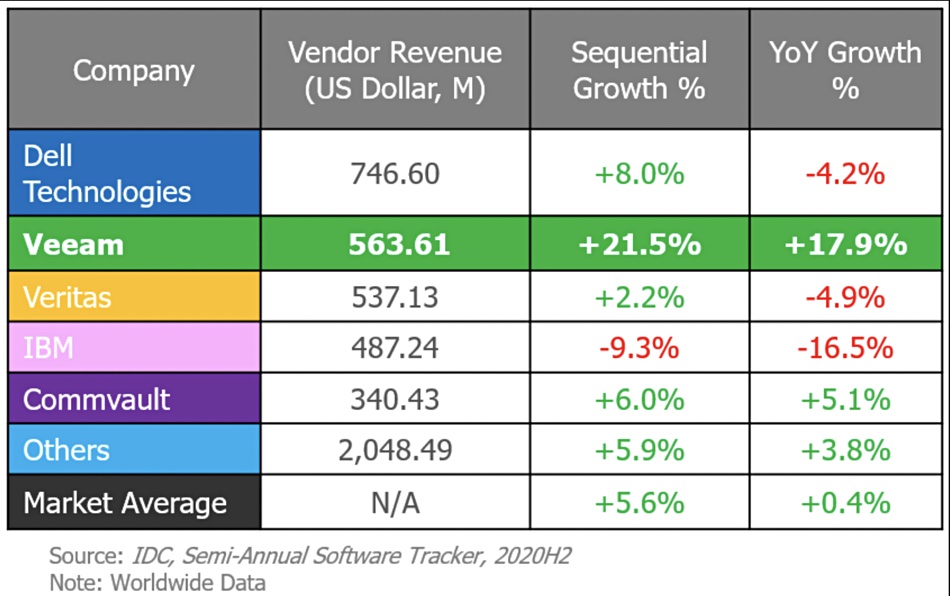Veeam has been talking up a renewed platform push, announcing extended workload and archive support in a mission to protect a broader range of kit. Its execs claim to be on track to overtake Dell technologies as the world’s largest storage software vendor, claiming they could do this “in two years.”
The second half of 2021 will see it deliver cloud-native backup for AWS, Azure, Google Cloud, and Microsoft Office 365. It will also integrate its acquired Kasten K10 Kubernetes backup capability into the main Veeam Platform. The announcements came at its VeeamON 2021 virtual conference, where the vendor said it wanted to protect all workloads across all environments: cloud, virtual, SaaS, Kubernetes and physical.

Danny Allan, Veeam’s CTO and SVP for Product Strategy, issued a statement: “With Veeam’s single platform we are helping our customers ensure that every piece of data, every workload is safe, secure and easily recoverable no matter where they reside.”
Allan lauded Veeam’s growth: “Veeam is the largest storage company that’s not making storage or infrastructure, and is by far the #1 pure play data protection vendor on the planet. We moved more than 100 PB of data into our top three cloud object storage providers alone in just the first quarter of 2021, compared to 242 PB in all of 2020, and we recently surpassed 1 million active Veeam Backup & Replication installations.”
Ambitious ‘every workload’ goal
Referring to a worldwide revenue and growth for the Data Replication & Protection Software market chart compiled by industry analyst IDC, he said: “We are proud of our success, and that we are now #2 in the market, and we know that this is just the tip of the iceberg.”

Allan added: “I believe that Veeam will become the #1 industry leader in total [software] revenue within the next 2 years.”
So far Veeam says it supports 83 primary storage arrays and 85 secondary storage systems and has validated support for 37 object storage systems, 12 of which are immutable – including AWS, Azure and Google Cloud Storage.
The firm stated in a release: “Modern Data Protection, defined by Veeam, provides a single platform for data resiliency to protect every workload, access all platforms with a single experience, reduce operational costs, and ensure guaranteed recovery.”
This self-imposed Veeam target, of protecting all workloads across all environments, is a formidable undertaking and one which no other backup supplier has publicly proclaimed as its aim. It certainly gives both Veritas and Sanjay Mirchandani’s Commvault something to aim at.
Red Hat and Kasten
As part of this drive to protect all systems, Veeam is adding support for Red Hat Virtualization (RHV) backup with agentless, image-level backup and recovery of RHV virtual machines using changed block tracking (CBT).
The system stores RHV backups in Veeam backup repositories – disk, solid state, object storage, cloud, and tape – enabling centralised backup management and monitoring. These same repositories will store Kasten K10 backups of Kubernetes-orchestrated container workloads.
Kasten workloads will be added into Veeam’s automated backup data lifecycle management for policy management. Kasten’s Kubernetes backups can be stored in ransomware-proof immutable locations.
Public cloud
Veeam says it already provides cloud-native support for AWS, Azure and Google Cloud and provides backup, recovery and migration across on-premises and public clouds.
This is being extended. Amazon Elastic File System (EFS) and Azure SQL protection have both been added. Veeam also announced public cloud archiving with support for Amazon S3 Glacier and Glacier Deep Archive, Azure Archive Storage and Google Archive Cloud Storage.
Microsoft Office 365 backups can have secondary backup copies made in S3 Glacier and Glacier Deep Archive and also in Azure Archive.
Veeam customers also get a self-service portal for recovery, lowering restoration admin needs.








